What to eat to lose weight? Faced with so much information, many people get lost in what helps or hinders weight loss.
In theory it seems simple, but in practice it is different. You always hear about what not to eat, the “forbidden” foods for those who want to lose weight. Is this the right way to look at food?
It is easy to list “prohibited” and “permitted” foods here, but you will hardly be able to restrict yourself to that list. And you will end up with foods that will leave you in doubt.
Now, if you really learn to improve your food choices, that control will be in your hands. And with the reduction of mistakes made when choosing your foods, your weight loss process will finally succeed.
Keep this article slow to learn what to eat to lose weight, and how to make better choices!
Index
I want to lose weight, what should I worry about?
1. How much and what kind of carbohydrate should I eat?
2. Can proteins help me lose weight?
3. Should I exclude fats from the diet?
4. What is the role of vegetables in the diet?
5. What care should I take when choosing fruits?
6. Does drinking water help you lose weight?
Completing
What to eat to lose weight

I want to lose weight, what should I worry about?
Before thinking about what to eat to lose weight, let’s think about how much to eat. We know that the amount of calories eaten daily has a direct impact on weight.
That is, when you consume more than the body uses, you will gain weight, if the consumption is less, the weight decreases. If the amount of calories consumed is the same amount spent, the weight stabilizes.
Having said that, you may have come to the following conclusion: so I shouldn’t be concerned with what I’m eating, but with the caloric value of each food. Right?
Wrong! Conventional nutrition knowledge suggests that regardless of the source, a calorie is a calorie. However, recent research shows that some foods can make weight loss or control easier.
And at the same time, certain foods can make us predisposed to consume more calories. Another important factor is to understand that the body absorbs certain foods in different ways. Even if they both provide the same nutrient.
Are you confused? Calm down and I’ll explain. First I will teach you how to choose the best source of carbohydrate, protein and fat foods. And 4 more tips for you to know what to eat to lose weight.
1. How much and what kind of carbohydrate should I eat?
Carbohydrate-reduced diets are the most effective for weight loss. However, different from what many think carbohydrates are yes, necessary.
Carbohydrates are the main source of energy in the diet, and are responsible for various bodily processes. In addition to being essential for the proper functioning of the brain.
In a dietary reeducation it is recommended to consume 45% to 65% of carbohydrates. That is, in a diet of for example 2000 kcal, from 900 to 1300 kcal present in the diet must be sources of carbohydrate.
For low-carb diets, the amount must be less than 40%. This is equivalent to a maximum of 800kcal of the diet, considering a 2000kcal diet.
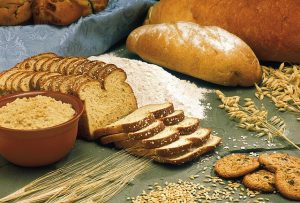
When it comes to weight loss, the quality of the carbohydrate ingested is just as important as the quantity.
As I mentioned in the previous topic, our body absorbs certain foods differently. Even if they both provide the same nutrient.
In the case of carbohydrates, this difference exists due to the glycemic index. The basic difference between them is the time it takes our bodies to absorb carbohydrates.
Foods with a high glycemic index are absorbed more quickly. This causes a rapid increase in the blood sugar concentration, raising insulin levels.
In this way, causing part of this absorbed sugar to be stored in the form of fat. So the ideal is to avoid foods with a high glycemic index. See some examples:
Foods with a high glycemic index
- White rice
- White bread
- Pasta, cakes and biscuits made with white wheat flour
- Sweets
- Sugary drinks
- Breakfast cereals
- Natural fruit juice
Yes! Fruit juices have a high glycemic index. Precisely because it is in liquid form and has little fiber. For those who want to lose weight, the best option is to eat the fruit, with the skin, or with the bagasse.
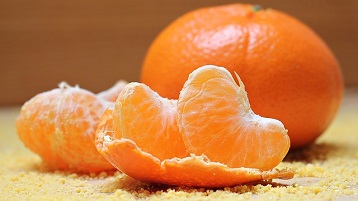
And for fruits like mango, banana, and papaya, a good way to reduce the glycemic index is to add oats, chia or flaxseed.
Carbohydrates with low glycemic index, act in the opposite way. That is, they do not generate high insulin spikes. In addition, they can help prevent heart disease, and diabetes, and because they are sources of fiber, increase the feeling of satiety.
See some examples:
Low glycemic index foods
- Brown rice
- Brown bread
- Macaroni, cakes and cookies made with whole wheat flour
- Sweet Potato
- Oats
- Chickpeas
- Quinoa
Learn more about carbohydrates in the post Everything about carbohydrates.
2. Can proteins help me lose weight?
Yes! Proteins are very important for those who want to lose weight.
Proteins are nutrients that promote a higher caloric expenditure, as they demand an increased caloric expenditure for the digestive process.
In addition, during the weight loss process, muscle mass loss can happen. And this loss causes the metabolism to slow down, making the weight loss process even more difficult.
The greater the amount of muscle mass, the more energy the body expends. So the metabolism becomes more active.
Probably, you should know someone who has lost a lot of weight, and complains of flaccidity. This flaccidity increases when the person does not have as much muscle mass. Diets with higher amounts of protein prevent the loss of muscle mass, and mask that flab.
Still, if you manage to include strength exercises, such as weight training, the chances of you preserving your muscle mass will be much greater.
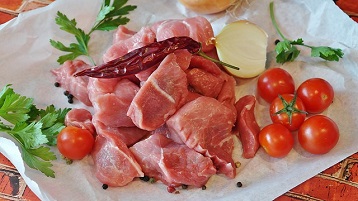
Another benefit of maintaining a protein-rich diet is the increased feeling of satiety, provided by the slow digestion of protein. This will help you control your food intake, avoiding exaggeration.
So include good sources of protein in your diet, preferably with every meal!
Protein source foods
- Natural yogurt
- Eggs
- Cheese
- Red meat
- Chicken
- Fish
- Quinoa
- Chickpeas
- Lentils
See also: Proteins to lose weight and burn fat
3. Should I exclude fats from the diet?
No! When thinking about what to eat to lose weight, many believe it is necessary to exclude fats. However, fats are necessary! Once again your attention needs to be on the quality of the fat.
Studies carried out among people who followed diets with medium to high levels of fat, and diets with low fat content, it was noted, that the weight loss was greater in the groups that consumed more fat.
Precisely because good fats help in the weight loss process. They bring satiety, they are sources of protein.
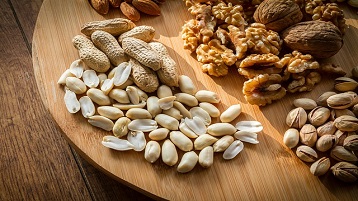
Good fats act to increase HDL popularly known as “good cholesterol”. They are a source of omega 3 and omega 6, which help to reduce LDL known as “bad cholesterol. Another tip is that including good sources of fat in the diet helps to control the urge to eat sweets.
Good fat source foods
- Castanhas
- Nozes
- Almond
- Amendoim
- Olive oil
- Linseed
- Fish
- Avocado
- Coconut
4. What is the role of vegetables in the diet?
Variety is everything! That should be your rule when choosing vegetables for your diet!
These vegetables have a low carbohydrate content, many nutrients. They are rich in vitamins and minerals. It has a great role in increasing satiety, as they are excellent sources of fiber.
In addition, they are excellent antioxidants, that is, they have the ability to decrease oxidative stress in cells. One of the main causes of premature aging, and some types of cancer.
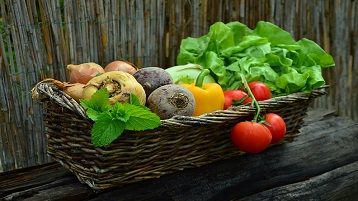
So, eat vegetables at will! Always try to vary.
At least half of your plate needs to be composed of vegetables. They can also be included for breakfast and intermediate snacks. accompanying sandwiches, or preparations such as shredded chicken, or omelet.
Just be a little careful with pumpkin and beets, as these two vegetables have a higher amount of carbohydrate.
Examples of vegetables
-
- Broccoli
- Couve
- Rucula
- Agrião
- Acelga
- Lettuce
- Asparagus
- Spinach
- Chuchu
- Zucchini
- Carrot
- Chili
- Eggplant
- Okra
- Tomato
- Cucumber
- Radish
5 . What care should I take when choosing fruits?
We know that fruits are essential for a balanced diet and, like vegetables, are excellent sources of vitamins, minerals and antioxidants.
However, there are some fruits that may be your allies in the weight loss process, as they have more fibers, a lower caloric value, and a low amount of carbohydrates.
In addition, some are still sources of good fats, such as avocado and coconut, and help satiety.
It is important not to forget to include them in your daily diet.
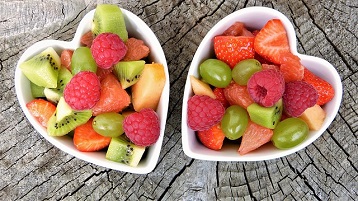
The best fruits for those who want to lose weight
- Apple
- Passion Fruit
- Morango
- kiwi
- Lemon
- Papaya
- Pineapple
- Plum
- Coconut
- Avocado
6. Does drinking water help you lose weight?
Yes! Water acts indirectly in the fat loss process, and can help to reduce fluid retention, decreasing body swelling. Consuming water can help to increase metabolism, by a cellular mechanism.
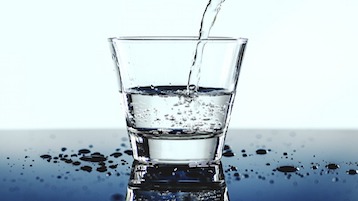
A study was carried out with 14 participants, in which they consumed 500ml of water and had a 30% increase in metabolism. This increase occurred due to the body process called thermogenesis, in which the body acts in regulating temperature.
So, after consuming water, our body needs to increase its temperature. Causing the increase in metabolism, as was observed in the research. Which facilitates the weight loss process.
It is also worth mentioning that having the habit of having a glass of water 30 minutes before meals helps to increase satiety. This prevents the body from mistaking thirst for hunger, causing you to eat more than necessary.
The daily water recommendation is at least 35 ml per kilogram of weight. For example, for a person who weighs 65 kg, the following calculation should be made: 35 x 65 = 2275ml. Therefore, a minimum daily intake of 2,275 ml of water should be made.
Completing…
- To lose weight it is necessary to pay attention to the quantity and quality of the food eaten.
- When choosing carbohydrates, give preference to whole grains, legumes, sweet potatoes and fruits.
- Increase your protein intake in your diet.
- Consume good fat sources daily. Like chestnuts, walnuts and olive oil.
- Make it a habit to consume vegetables and legumes daily, preferably with every meal.
- Include fruits daily in your diet, and give preference to those that have more fiber and less calories.
- Drinking plenty of water helps with the weight loss process. So drink plenty of water!
